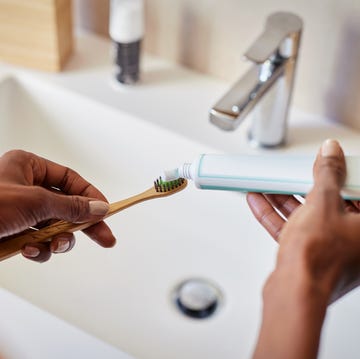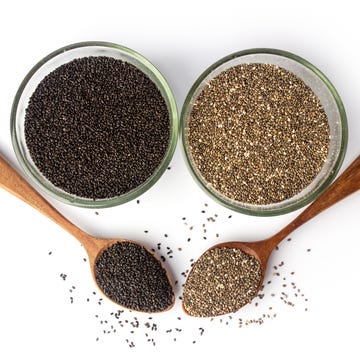The National Institutes of Health (NIH) estimates 42% of Americans over the age of 55 will develop dementia, a term for brain diseases associated with memory loss, behavioral changes and decreased cognitive function. But new research into a common vaccine could offer some hope.
According to a new study in Nature, the vaccine for shingles could significantly reduce the risk of dementia. These findings, the researchers say, support an emerging scientific theory that viruses which affect the nervous system, like shingles, can increase the chances of having dementia — therefore, being inoculated against the virus could have the opposite effect.
“For the first time, we now have evidence that likely shows a cause-and-effect relationship between shingles vaccination and dementia prevention,” says Pascal Geldsetzer M.D., Ph.D., M.P.H., assistant professor of medicine at Stanford University and the study’s senior author. “We find these protective effects to be large in size, substantially larger than those of existing pharmacological tools for dementia.”
If you're looking for a way to maintain a healthy brain, keep reading to learn more about both the shingles vaccine and the surprising findings of the study.
What is shingles?
Shingles (herpes zoster) occurs when the varicella-zoster virus (VZV) — the one that causes chickenpox — reactivates in the body. If you had chickenpox, the virus remains dormant in your nerve cells and can rear its head during adulthood. According to the NIH, shingles affects between 20 to 30% of people during their lives, and is most prevalent in people ages 50 and older. This can be chalked up to our immune systems weakening with age.
People who have shingles most commonly experience a painful, itchy or tingly rash on one side of the face or body. The rash comes in the form of blisters that will scab over within 7 to 10 days. With shingles, you may also have fever, headaches, chills or an upset stomach, according to the Centers for Disease Control and Prevention (CDC). Treatments include antiviral medications, OTC or prescription pain relievers, and self-care home remedies such as applying wet compresses, calamine lotion and taking warm oatmeal baths.
If you've had chickenpox, the only way to safeguard yourself from shingles is to receive the Shingrix vaccine, which the CDC recommends for adults 50 and over, and anyone 19 and over who are immunocompromised as a result of disease or therapy. Shingrix comes in two doses, with the second one given two to six months after the first shot. The CDC reports the vaccine is more than 90% effective at preventing shingles.
Now you know why getting the vaccine is key for shingles prevention, and thanks to this study, we know have some viable evidence it can also help ward off cognitive decline.
What the study found
Dr. Geldsetzer and his colleagues rooted their study in the interest of wanting a more up-close look between the shingles vaccine and its relation to the onset of dementia. It’s not that prior studies on the topic didn’t exist, but those studies compared people who chose to get the vaccine compared to those who didn't, and these groups usually differ in lifestyle factors such as diet and exercise, which are difficult to measure. This can bias the analyses and in general, the evidence isn't solid enough to make recommendations on, he says.
What sets the Stanford study apart is the researchers’ different approach, choosing to focus on, and compare the likelihood of dementia in people who received the shingles vaccine because they were born on, or just a few days later than September 2, 1933, which made them eligible versus those who were born just a few days earlier, and so therefore, weren't eligible for the shingles vaccination.
The researchers based their findings on data from a Welsh shingles vaccine rollout that started on September 1, 2013. Because Wales needed to ration the vaccine’s limited supply, they used that cutoff date to decide who could get the vaccine and who couldn't. After analyzing the health records of the more than 280,000 Welsh adults who didn’t have dementia at the start of the vaccination program, a striking difference emerged between the two groups.
“To our amazement, we found that receiving the shingles vaccine reduced the chance of being diagnosed with dementia in the subsequent seven years by roughly 20%,” says Dr. Geldsetzer. “If this is truly a causal effect, then getting the shingles vaccine would be much more effective in delaying or preventing dementia than any existing pharmacological tools.”
Another interesting discovery? The vaccine's protective effect was greater in women than in men. “This could potentially be due to sex differences in the immune response or in the way in which dementia develops,” Dr. Geldsetzer says. “Women on average have higher antibody responses to vaccination, for example. We also know that both shingles and dementia are more common in women than in men.”
Beyond the Welsh findings, the Stanford team has looked at health records from shingles vaccine rollouts from other countries, including England, Australia, New Zealand and Canada. In dataset after dataset, the researchers continued to notice the vaccine was a strong protective signal for dementia, showing the link wasn’t a fluke.
Why this study matters
“This research is newsworthy because the shingles vaccine can now be looked at as a possible intervention in helping us to prevent or push dementia to later time,” says Manisha Parulekar, M.D., a geriatrician and director of the division of geriatrics and co-director of the Center for Memory Loss and Brain Health at Hackensack University Medical Center in Hackensack, NJ. “We don’t have a lot of current [intervention] options out there, and the 20% reduction in dementia risk is the best we’ve seen so far.”
Dr. Parulekar says she understands the importance of the study in relation to how the shingles virus can have a negative effect on the brain. “The reactivation of the chickenpox virus can trigger significant inflammation in the nervous system, potentially damaging neurons in the brain and contributing to cognitive decline,” she says.
Researchers still don't know how the shingles vaccine protects against dementia. It could help by stimulating your immune system, specifically reducing reactivation of the chickenpox virus, or by some other mechanism, notes Dr. Geldsetzer, who is currently trying to raise funds from private and philanthropic foundations to conduct further research. “We want to be able to do a clinical trial to definitively test if a shingles vaccination prevents or delays dementia, so if there’s anyone out there who might be interested in funding such a trial, I’d love to hear from them,” he says.
The bottom line
If you’re 50 or older, and you haven’t yet gotten your shingles vaccine, get it, and be sure to follow through with both doses for the maximum benefits, recommends Dr. Parulekar. “Not only can the vaccine protect you from the painful symptoms of shingles, but now there’s one more reason, and that’s to possibly lower the risk of dementia,” she adds. “Why take a chance when we have a very effective tool available? Age is a risk factor for both, so you always want to be in preventative mode.” In other words, your shingles vaccine is a win-win.













